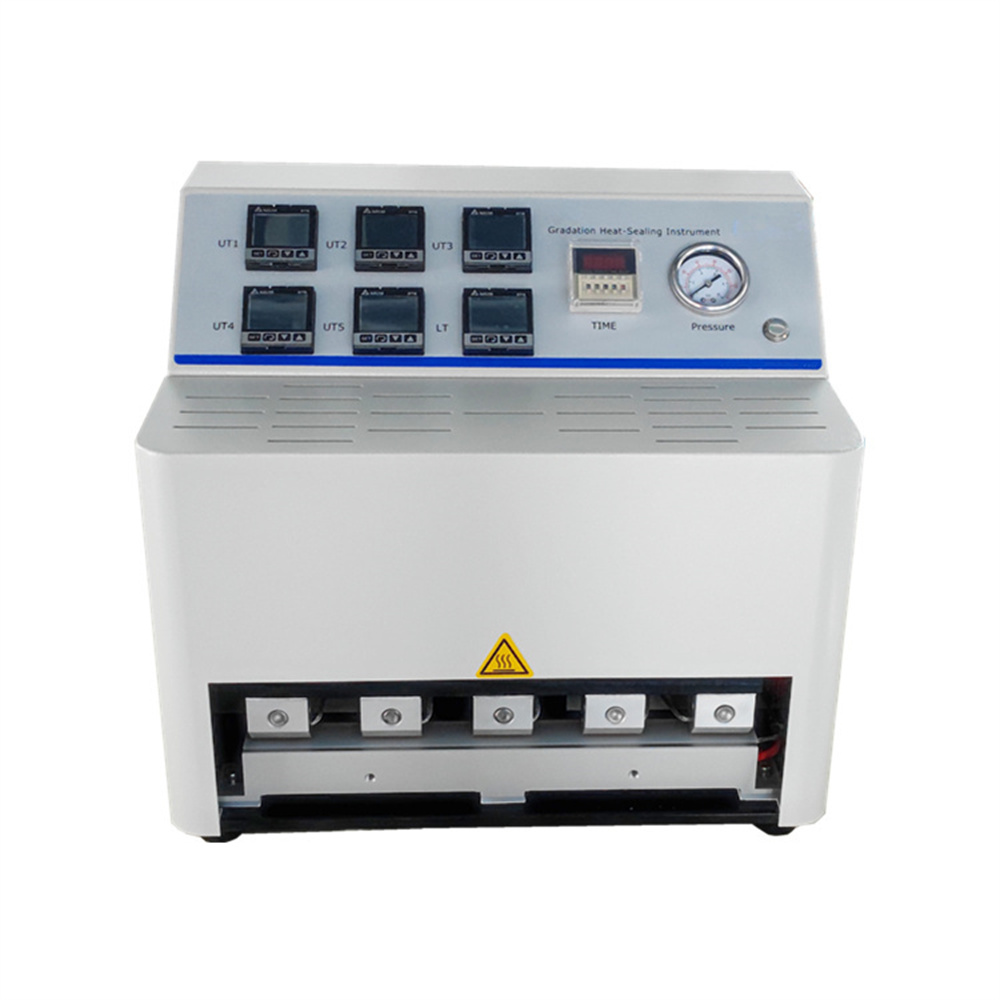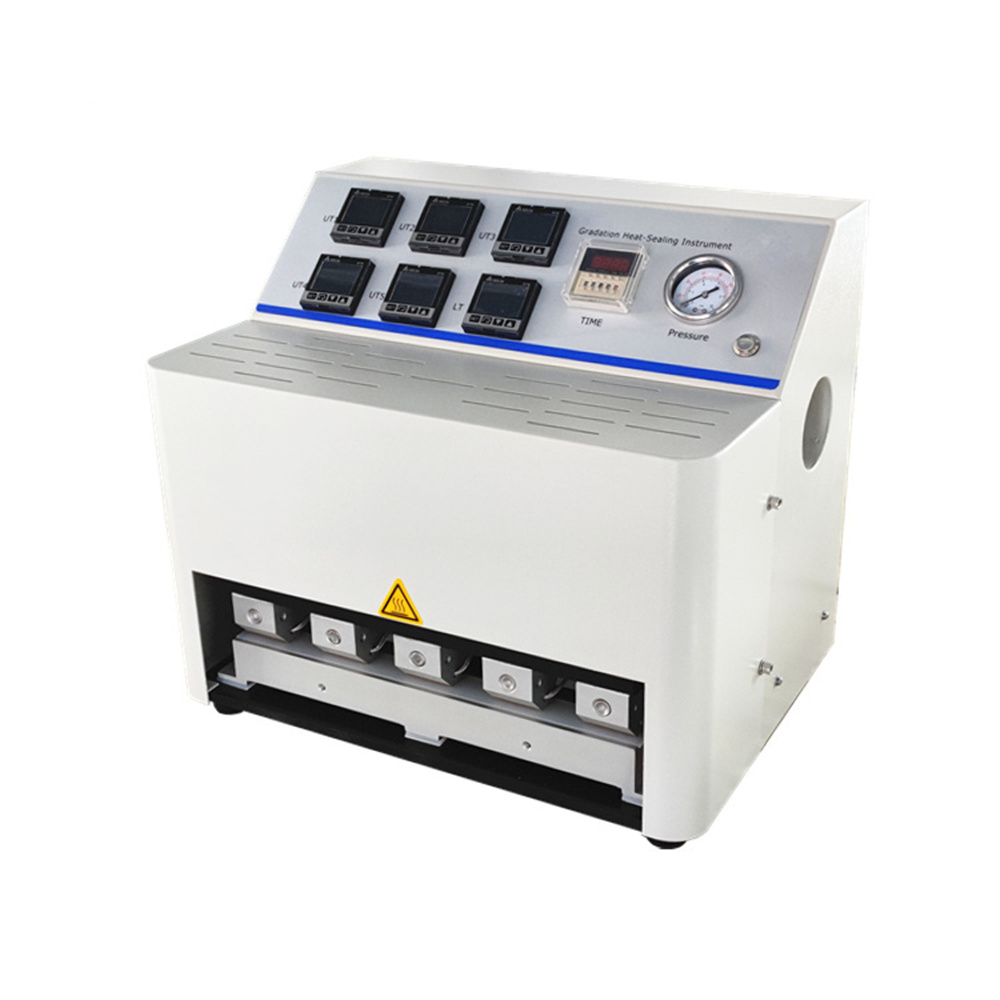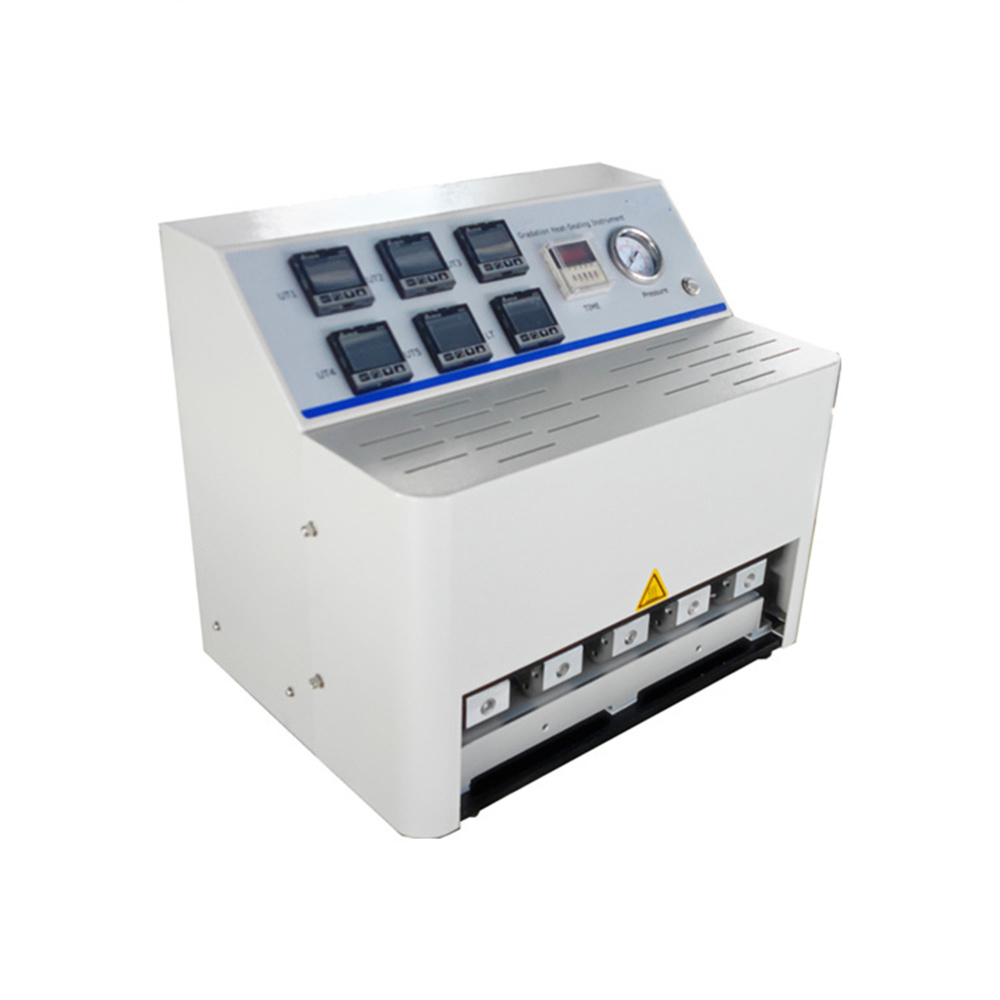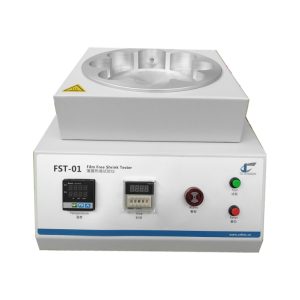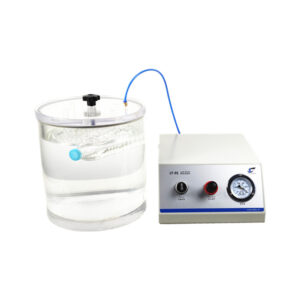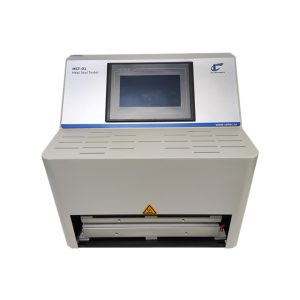Introdução
In the packaging industry, ensuring that materials such as films, laminates, and flexible barriers form strong, durable seals is critical for maintaining the integrity and safety of the packaged product. Whether you’re packaging food, pharmaceuticals, medical devices, or electronics, heat seal strength plays a key role in protecting your products from contamination, leakage, and spoilage.
O Heat Seal Strength Tester is a precision instrument designed to evaluate the heat-sealing properties of packaging materials, ensuring that seals are strong, reliable, and consistent. This tester simulates the real-world heat sealing process, adjusting temperature, pressure, and sealing time to determine the ideal conditions for creating perfect seals.
O Gradient Heat Seal Test is an advanced method that enhances testing efficiency by applying a controlled temperature gradient across the sealing area, allowing for multiple tests at different temperature settings simultaneously.
Key Features of the Heat Seal Strength Tester
Controlled Testing Conditions for Precision Seals
O Heat Seal Strength Tester is designed with flexibility and accuracy in mind. Its adjustable settings for temperature, pressão, e sealing time make it possible to simulate various sealing conditions used in the packaging process. These settings allow manufacturers to test and optimize their materials to achieve the most reliable and robust seals under real-world production conditions.
Temperature Gradient for Optimal Testing
One of the standout features of this tester is the Gradient Heat Seal Test functionality, which applies a controlled temperature gradient across the sealing area. This capability allows multiple sealing conditions to be tested at once, improving testing efficiency and reducing downtime between tests. By testing at various temperatures simultaneously, manufacturers can more effectively determine the best conditions for sealing different materials and improve the overall packaging quality.
In essence, the Gradient Heat Seal Test makes the Heat Seal Strength Tester a Multi-Station testing device that can run several tests at different temperatures simultaneously, saving time and enhancing the efficiency of the testing process.
ASTM F2029: The Standard for Heat Seal Strength Testing
Overview of ASTM F2029-16(2021)
Norma ASTM F2029-16(2021) is the Standard Practice for Making Laboratory Heat Seals to determine the heat sealability of flexible barrier materials. This standard is used to evaluate the strength of heat seals made on various packaging materials under laboratory conditions.
O Norma ASTM F2029 standard provides the procedures and requirements for creating reliable heat seals and measuring their strength, which is essential for assessing the integrity and quality of packaging materials. Adhering to this standard ensures that manufacturers produce packaging that meets the required durability and sealing performance for product safety.
Test Methods According to ASTM F2029
O Heat Seal Strength Tester follows the procedures outlined in ASTM F2029 to create laboratory-based heat seals and measure their strength. Here’s how the process works:
- Preparação da amostra: A sample of the packaging material is placed between two parallel heated sealing jaws.
- Processo de selagem: The tester applies heat, pressure, and time settings to simulate the real-world sealing conditions. The upper jaw moves down, exerting pressure on the material while applying heat.
- Testing Time: The sealing time is adjustable from 0.1 seconds to several hours, allowing for testing at different time intervals.
- Seal Evaluation: Once the sealing time is complete, the jaws are lifted, and the test is concluded. The seal is then analyzed for strength using methods such as air-leak tests, dye penetration, visual inspection, or microorganism penetration.
This process mimics the conditions in which heat seals are created during the packaging process, helping manufacturers determine whether their packaging materials will withstand the required stress in real-world environments.
Technical Features of the Heat Seal Strength Tester (GHS-01 Gradient Heat Seal Tester)
- Sealing Jaws and Heating Mechanism: The upper and lower jaws are made of high-quality aluminum and feature independent heating systems that eliminate heat loss, ensuring smooth and uniform temperature distribution during testing.
- Controlador de temperatura PID: The advanced PID (Proportional Integral Derivative) temperature controller ensures precise temperature control, allowing for consistent and reliable heating throughout the test process.
- Timer and Proximity Sensor: The combination of an accurate timer and proximity sensor synchronizes the start of the sealing process with the jaw movement, ensuring that the test starts at the correct moment and runs for the exact time required.
- Sealing Pressure and Jaw Customization: The tester applies uniform sealing pressure between 0.15–0.7 MPa and offers customizable seal jaws (dimensions, shapes, and patterns) to accommodate different testing needs and packaging materials.
- Características de segurança: User safety is a priority with features such as an anti-scald front cover and manual/foot switches to protect operators during testing.
Parâmetros principais
| Temperatura de vedação. | Ambiente~250℃ |
| Temp. Gradient | ≤20℃ |
| Desvio | ±0,2℃ |
| Tempo de selagem | 0,1S~9999S |
| Pressão de vedação | 0,15~0,7 MPa |
| Seal Jaws(mm) | U:40*10 5PCS/L:330 1PCS |
| Gas Input | 0.7 MPa with Ф6 mm Pipe |
| Poder | CA 220 V 50 Hz |
Processo de teste
- Colocação de amostra: Place the sample material between the two parallel heated jaws.
- Heating and Sealing: Set the temperature, pressure, and time, then allow the heating jaws to apply pressure and heat to the sample.
- Completion and Evaluation: After the preset sealing time, the jaws open, and the seal’s strength is evaluated using a variety of methods, such as air-leak testing or visual inspection.
Applications and Industries Served
O Heat Seal Strength Tester is essential for quality assurance across several industries:
- Indústria de embalagens: Ensures the integrity of packaging materials for food, beverages, and consumer goods.
- Produtos farmacêuticos: Verifies that seals on drug packaging meet regulatory standards and maintain product sterility.
- Dispositivos médicos: Tests packaging materials for strength and protection of sensitive medical devices.
- Electronics and Other Industries: Assesses packaging materials for electronics and various other industries that require strong, reliable seals.
O Heat Seal Strength Tester is an essential tool for manufacturers looking to ensure the quality, safety, and durability of their packaging materials. Whether you’re sealing food, pharmaceuticals, or medical devices, this tester provides precise, reliable results for optimal packaging performance. Equipped with Gradient Heat Seal Test functionality and compliant with Norma ASTM F2029, it’s the perfect solution for achieving superior heat seals every time.
FAQ Section: Common Questions About Heat Seal Strength Testers
- What materials can be tested with the Heat Seal Strength Tester?
- The tester is ideal for testing a wide range of packaging materials, including films, laminates, and flexible barrier materials.
- What is the role of the Gradient Heat Seal Test?
- O Gradient Heat Seal Test allows for testing at different temperature settings simultaneously, enhancing efficiency by reducing testing time and improving seal performance.
- What industries can benefit from heat seal testing?
- Industries such as food packaging, pharmaceuticals, medical devices, electronics, and consumer goods all benefit from using the Heat Seal Strength Tester.
- How does the Heat Seal Strength Tester ensure accuracy?
- With features like precise temperature control, adjustable sealing pressure, and customizable test settings, the tester ensures reliable and repeatable results every time.
- Is the Heat Seal Strength Tester compliant with ASTM standards?
- Yes, the tester meets Norma ASTM F2029, ensuring compliance with industry standards for testing heat seal strength and material durability.

